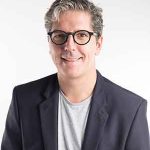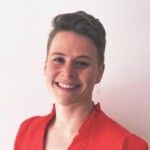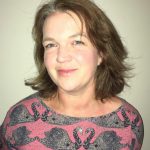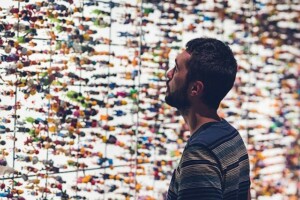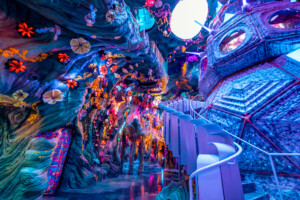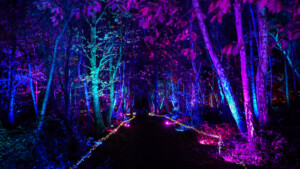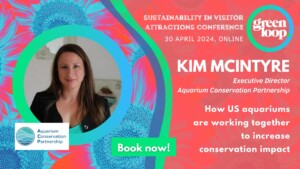In September 2016, The Vancouver Aquarium Marine Science Centre is hosting the ninth International Aquarium Congress.
In a departure from the IAC’s regular format, eight experts will be delivering a comprehensive overview of the current state of the world’s oceans.
“We are fundamentally changing the ecosystem, the machinery, in the ocean, ” warns Dr. John Nightingale, CEO of Vancouver Aquarium.
But, while human beings are undoubtedly part of the problem, Nightingale is adamant that they are also part of the solution.
 He spoke with Blooloop about the Vancouver Aquarium, the IAC and his particular interest in the interface between nature, science and the public.
He spoke with Blooloop about the Vancouver Aquarium, the IAC and his particular interest in the interface between nature, science and the public.
Nature, Science and Ordinary People
Nightingale grew up in a small community in eastern Oregon’s mountain country where he spent much of his time playing in the hills and along the river.
It was the beginning of a lifelong passion for science and nature which, despite his other interests, persevered through high school and the first four years of university.
“I was equally interested in music, and spent part of a year at university being a music major, and part being a pre-law major, before I threw my hat entirely into biology.”
The location of his family’s holiday home on the coast near Newport (where Oregon State University has a major marine lab) sparked his fascination with the ocean.
“As a high school kid I hung out at the marine lab during the summer, and got to go out in boats with the scientists, and to see the research that was going on. I found the ocean a fascinating place, so went to graduate school at the University of Washington and Seattle to do a degree in Fisheries.”
%20(2).jpg)
The University of Washington School of Fisheries has a salmon run that goes from the ocean, up through the middle of Seattle and ends at the university. To help make ends meet, Nightingale worked in the salmon hatchery. Part of that work involved lowering the water level in the pond where the adult salmon had swum to before catching and spawning them.
“The public would often wander over there on nice days, to have a look at what was going on. And school buses would come. So, the graduate students group took responsibility for organising all these visits because there were getting to be so many of them that they were clogging up all the operations.
“I would look at these people and think ‘this is stuff that we all take for granted – we’re out here two days a week spawning salmon, counting them and weighing them, and people find it fascinating’.
“That started a lifelong interest in the interface between nature, science and ordinary people. It’s been my driving force ever since.”
.jpg)
Nightingale became increasingly focused on the idea that since human beings had caused so many problems in the natural world, they could also hold the key to solving them.
“We need more and more people who are engaged, curious, aware, learning; understanding that we are all directly involved in what’s going on in the world’s freshwater and ocean ecosystems.”
Vancouver Aquarium – By the Community for the Community
Nightingale came to the Vancouver Aquarium in his mid-forties, having worked in a number of aquariums and as an exhibit design consultant working with both aquariums and museums.
“I don’t think I’d ever been in any place longer than six years, ” he says. “I came to Vancouver thinking, ‘five years, and we’ll see what’s next, ’ but that was 23 years ago.”
.jpg)
(Above: Chester – rescued false killer whale)
What he found in Vancouver was an unusual public institution. The idea to found an aquarium had been arrived at by a diverse set of individuals from within the local community back in 1950. Together, they sat on a founding board which drove the creation of the aquarium over the next five years until it finally opened.
“At that time in North America there was the Steinhart Aquarium, the Shedd Aquarium in Detroit. The one in New York wasn’t reopened yet – there really weren’t many aquariums, ” explains Nightingale.
“These people thought Vancouver needed one, and they did something very unusual – they gave the not-even-born-yet aquarium four very clear mandates.”
.jpg)
(Above: Vancouver Aquarium Pacific Canada Gallery)
Four Clear Mandates
The mandates were firstly that the aquarium would play a major role in education:
“One of those people was the superintendent of the school.”
The second was that it would conduct original scientific research:
“Some of those people were University of British Columbia professors.”
The third mandate was that the aquarium would help make Vancouver more attractive:
“The tourism leader of the day was one of that group.”
.jpg)
(Above: Schoona, the rescued sea turtle)
Lastly, and most unusually, it was decided that the aquarium would operate in a financially self-sufficient manner independent of government. It would be a not-for-profit business, essentially owned by the community.
“It was unheard of to think of doing that in 1950 without some kind of subsidy from government.”
Back then, conservation was an unfamiliar concept. Attitudes began to change in 1962, with the publication of ‘Silent Spring’, Rachel Carson’s damning indictment on the indiscriminate use of pesticides. Her study on the detrimental effects these farming practices were having on bird life and the wider environment led to the first Earth Day in 1970.
“Conservation was added as a fifth mandate in the early 1970s. And, the challenges of making a bigger and bigger difference to the conservation of our oceans and aquatic ecosystem has turned out to be so interesting and so challenging that I never had the need to go anywhere else.
“23 years later we’re still working on it.”

International Aquarium Congress
Today, the IAC is widely recognised as the most important event for the public aquarium and marine science industry, drawing scientists and aquarists from across the global public aquarium community to share developments in the fields of research, technology, education, animal husbandry, sustainability and conservation.
The Oceanographic Institute in Monaco organised the first aquarium congress back in the 60s.
“Then there was a dormant period, after which they organised another one – and at that meeting everybody said – this is so important we should do this periodically, ” says Nightingale. “And they chose every four years. So, they decided that the next congress would be in Europe/Africa zone, the next in the Americas zone, the next in the Asian zone.
“So, it has been held in Monaco, Boston, Tokyo, Monaco, Monterey Bay, Shanghai, Cape Town, Vancouver, and then it will go to Fukushima, Japan.
“And at the last IAC four years ago, we decided four years is too long: we’re going to move it to every three years.”
(The next one will actually be in two, rather than three years. It should be in 2019 in Japan, but because the Japanese are hosting the Olympics in 2020, they decided against conferences in 2019, and it was moved to 2018. In 2021 it will go back to the Europe/Africa zone.)
.jpg)
(Above: Vancouver Aquarium Teck Connections Gallery)
Vancouver Aquarium has been involved in the IAC from the very beginning, and on the steering committee since its inception.
The Congress is being held in Vancouver’s functional and beautiful Convention Centre between the 25th and the 30th of September, which Nightingale says is a wonderful month to visit the city:
“It’s a great place to come, with a lot of outdoor activities, ranging from whale-watching to kayaking, from bicycling to touring other aquariums on the West Coast, so it’s pretty well located in that regard – a very friendly and safe city. Vancouver is the most multi-cultural city in Canada, and maybe in North America.”
.jpg)
(Above: Comber – rescued sea turtle)
This year, he adds, the Congress is different from its previous incarnations, in that each delegate will leave the ninth IAC with…
“…a state-of-the-art briefing and understanding of what the current state of things are in our ocean and aquatic environments.”
Typically, a Congress comprises presentations on a whole variety of topics pertinent to managing and operating aquariums. There are now around 500 aquariums across the world, a number that is growing by as much as 20 or 25 a year. There has been a lot of growth in Asia in the last few years. The number of Chinese aquariums has gone from 15 up to 90 in the last ten years.
“So you hear an awful lot of presentations, ” admits Nightingale.
.jpg)
(Above: Aurora – beluga)
An Overview of the World’s Oceans and Freshwater Ecosystems
However, this year, he says, they are doing something unique. Eight experts will be delivering a comprehensive overview of the current state of the world’s oceans and freshwater ecosystems.
“So, everyone who comes to the Congress will have as good an understanding of the health of our oceans and freshwater ecosystems as it’s possible to get.”
The delegates will be given a briefing by senior scientist Dr Gregory Flato on climate change and climate change modelling; one by oceanographer John Englander on sea level rise, PH and other oceanographic indicators; one on the state of ocean fish populations by marine ecologist Dr Boris Worm; one on the state of freshwater fish populations by Dr. Paul Loiselle; one on the state of ocean pollution and plastics by Dr Paul Ross, one of the plight of coral reefs by Dr James Guest, and one on the state of amphibian and other non-fish aquatic species by Dr. Jennifer B. Pramuk.
“And, then, in the eighth keynote, Julie Packard, Executive Director of the Monterey Bay Aquarium, will provide the wrap-up, ” says Nightingale.
.jpg)
Visitor Engagement – The Science of Talking Science
Packard’s concluding talk will address the need for aquariums to use this information actively in their visitor experiences and communications to help make more and more people aware of these issues and to begin to make personal changes where they can.
“All our aquariums work with visitors, and those are the people we need to engage more.
“We’re trying to make it relevant to everyone, and, of course, everyone in an aquarium, whether you’re an aquarist, a marketing person, an administrator – you play a role in the visitor experience and resulting engagement that comes out of it.”
.jpg)
(Above: Daisy – rescued harbour porpoise)
Nightingale believes that although the oceans in general are not yet in a state of crisis, certain areas and species are getting pretty close.
“Probably the biggest of the main problems facing the ocean at the moment is over-fishing and mal-fishing, meaning fishing that damages the environment. 90% of the fish longer than six feet are gone in the ocean. We are fundamentally changing the ecosystem, the machinery, in the ocean.
“Changing climate will be the biggest impact. It’s already starting to be noticeable and have effect, by the shifting in ocean acidification or PH, and warming will, over the next 500 or 1000 years, have the biggest impact.
“Pollution and contamination continue to grow as impactors, and that includes ocean plastics, and shore-side development in all parts of the world as more and more people live close to the coast is a key factor in localised environments.”
%20(600x400).jpg)
Aquariums Worldwide Attract Three Quarters of a Billion Visitors
Nightingale is optimistic, however, that it can be turned around.
“I believe that aquariums have a very interesting role to play. If those 500 aquariums have a visitorship each year of something approaching three quarters of a billion people, and if we can get people interested, and curious, and talking about the ocean, governments respond to public discourse.
“If we have no greater goal than getting millions of people talking about this at the dinner table, or parties, or over the office lunchroom, we will have had a major impact. And that’s what it’s going to take, because the problems of the oceans are global, and, just like with climate change, it’s going to require governments working together to address them.”
Images kind courtesy Vancouver Aquarium.



